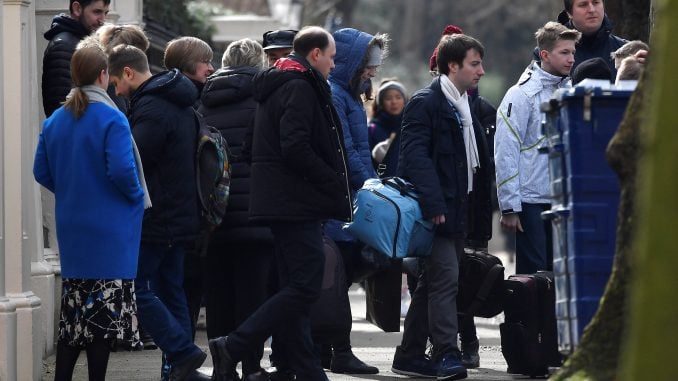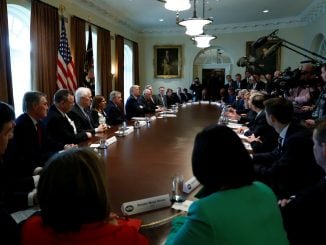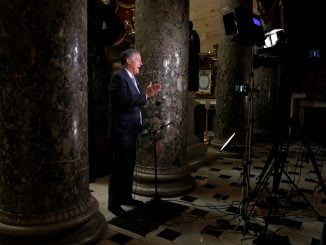
BERLIN/WASHINGTON, D.C. — Sen. Thom Tillis (R-N.C.) and Jeanne Shaheen (D-N.H.) are heading the Senate NATO Observer Group, after President Donald Trump announced last week that some U.S. nuclear, water and electric systems could have been sabotaged through Russian cyberattacks.
“These attacks are a sobering reminder of the work that desperately needs to be done to bolster our nation’s cyber defenses,” said Tillis and Shaheen. “The Kremlin is launching a myriad of hybrid attacks to weaken and undermine Western nations, particularly NATO members, and the United States is no exception. Many frontline NATO nations have made great strides in improving their cyber defenses to withstand Putin’s aggression. Continued cooperation with NATO members will be integral to our efforts to protecting the United States.”
The Senate group will keep lawmakers informed, outside of the classified national security committees, of defense spending commitments of Alliance members, the process of upgrading its military and counterterrorism capability, NATO’s enlargement, and its effectiveness in nonconventional or “hybrid” warfare.
The group was relaunched in March, amid allegations that Russia is committing cyberattacks on U.S. infrastructure. The group was initially stood up in 1997 under then-Senate Majority Leader Trent Lott (R-Miss.) and Minority Leader Tom Daschle (D-S.D.), but it was disbanded in 2007.
NATO Secretary-General Jens Stoltenberg says that the U.S. is not alone in the international cyberattacks, saying the Alliance must improve its defensive capabilities and willingness to act in the wake of increasingly aggressive and unpredictable actions by Russia.
Stoltenberg said he expected German Chancellor Angela Merkel and other NATO leaders to revamp their approach at the next NATO summit this summer, given a risk that Russia could gradually give more weight to nuclear weapons in its doctrine, exercises and new military capabilities.
“We must be alert and resolute,” Stoltenberg told German newspaper Welt am Sonntag on Sunday. “Russia must not miscalculate. We are always ready to respond when an ally is attacked militarily. We want credible deterrence. We don’t want any war. Our goal is de-escalation.”
Last week, Stoltenberg accused Russia of trying to destabilize the West with new nuclear weapons, cyberattacks and covert action, including the poisoning of a Russian former double agent and his daughter in the British town of Salisbury.
Sergei Skripal, a former Russian spy for the West, and his daughter Yulia were found unconscious on a bench in Salisbury on March 4. They remain in a critical condition in hospital of an apparent attempted murder with the Soviet-era nerve agent Novichok. Russia denies any involvement in what was the first known offensive use of nerve gas in Europe since World War II.
Over the weekend, Sen.Richard Burr (R-N.C.), chair of the U.S. Senate Select Committee on Intelligence, pointed to Russia as the culprit in the “brutal” attack.
“We stand with our British allies and the rest of the civilized world in denouncing the brazen and brutal chemical attack carried out against the United Kingdom,” said Burr in a statement with co-chair Mark Warner (D-Va.). “It has become clear that Russia is behind this effort to kill innocent civilians with a banned nerve agent. This reckless and hostile act violates every international and diplomatic norm. The Kremlin may deny it and spread misinformation through its propaganda machine, but we know the truth. We must come together as a global community and stand against Russia and the malicious actions of the Putin regime.”
On Monday, European Union members gathered in Brussels to continue talks on Brexit, but all stopped to express support for Britain in the wake of the nerve agent attack. All 28 EU foreign ministers issued a joint statement on the attack, expressing “unqualified solidarity.”
“The European Union takes extremely seriously the UK government’s assessment that it is highly likely that the Russian Federation is responsible,” the statement said.
Facing worldwide criticism, Moscow on Saturday announced the expulsion of 23 British diplomats in tat response to Britain’s decision last week to expel the same number of Russian diplomats from London.
“The Russian denial is increasingly absurd,” Britain’s foreign minister, Boris Johnson, told reporters as he arrived for the regular monthly meeting, which came a day after Vladimir Putin was re-elected for another six-year term as Russia’s president.

“This is a classic Russian strategy. … They’re not fooling anybody anymore,” Johnson said. “There is scarcely a country around the table here in Brussels that has not been affected in recent years by some kind of malign or disruptive Russian behavior.”
Russia’s overt threat has escalated in recent years to include the 2014 annexation of Crimea, support for separatists in Ukraine, military presence in Moldova and Georgia, meddling in Western elections and involvement in the war in Syria.




